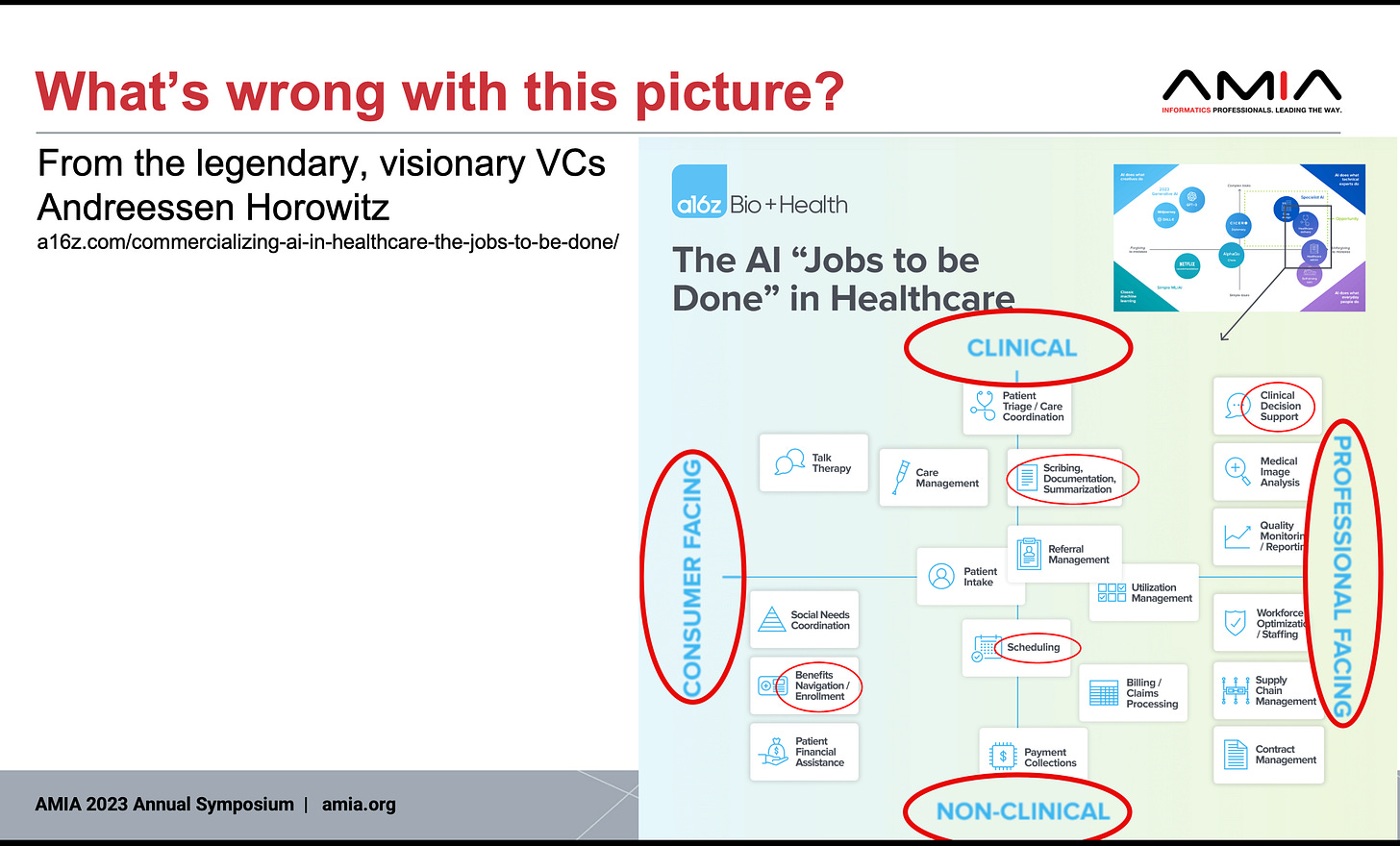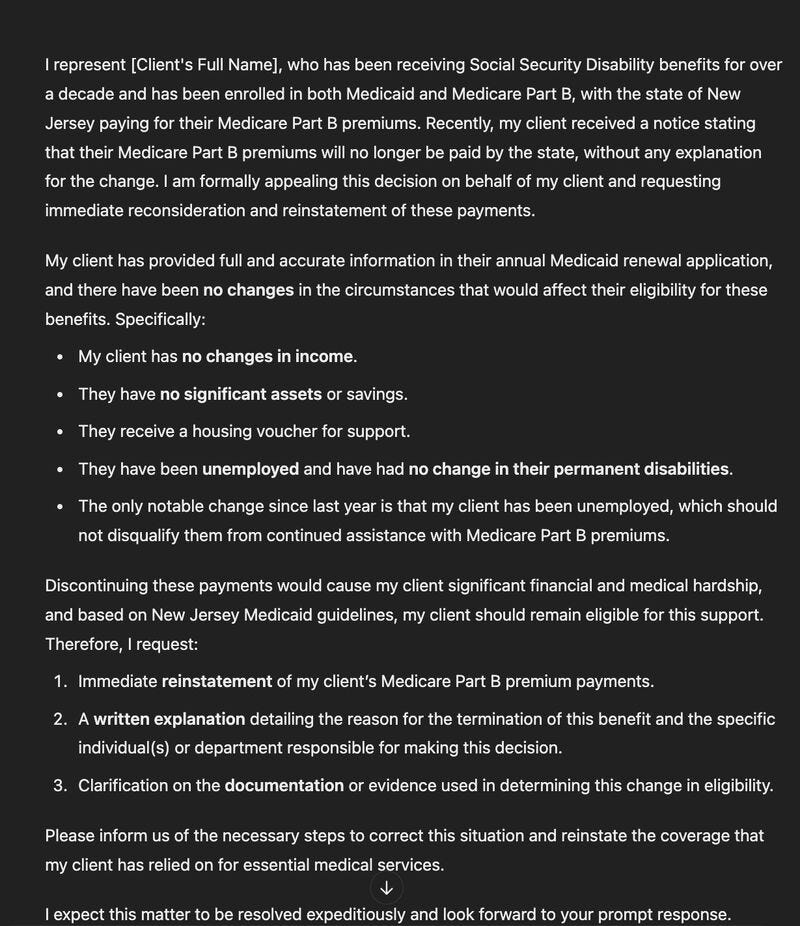#PatientsUseAI to fight benefit denials, leveling the playing field
Never forget, *patients* have work to do, just to GET healthcare
Below (at the heading Today’s Story) is a new true story that just happened, in which a skilled patient advocate used generative AI to fight back against the machine. But first, a bit of background is in order.
Recent posts on this blog have been about clinical uses of AI: using ChatGPT, Perplexity etc to solve medical puzzles. But as we said in our very first post, there are numerous other reasons patients use AI beyond difficult diagnosis:

What is patient administrative burden? It’s coping with all the bureaucratic crap that the health system throws in the path of patients and doctors as the system either screws up or overtly just plain gets in our way. Many articles have been written about physician administrative burden, but super-advocate Grace Cordovano has been saying for years that patient administrative burden is real too.
Except patients happen to be sick while coping with it. Unfair, right? It also throws things off balance.
Silicon Valley has a blind spot. Let’s fix it!
Here’s a map of all the “jobs to be done” in healthcare, published a year ago by the legendary investors Andreessen Horowitz, aka “a16z.” It maps out all the things a16z identified that people in healthcare might do with AI. But as I blogged back then, there’s something missing. What’s wrong with this picture?
What’s missing is that it implies that no work gets done (no “jobs to be done”) outside the consumer-facing wall. Which is plainly a gigantic blind spot, because there’s a LOT of work going on out here, as we struggle to get care or organize our medical records or all the use cases in the top graphic above. Here’s the correction:
Today’s story
You can read the whole story on Grace’s LinkedIn, but here are some highlights:
This week the patient received a notice stating that the state of NJ will no longer pay for their Medicare part B (medical insurance) premiums.
Patient:
👉 is permanently disabled
👉 has no significant income or assets
👉 receives a housing voucher, SNAP benefits, SS disability benefits
👉 has been unemployed for almost a year but is actively working with a job coach to find employment
The denial letter provides no reason as to why all of a sudden, after over a decade of having Medicare part B premiums covered, there would be a change.
The patient called Grace in tears. They got on Zoom and experimented with different prompts (that’s what experienced users do) and came up with a good letter of response, which they have already mailed. (The bureaucrats insist on paper mail.)
The prompt they developed
We’ve been starting to post “how-to” tips on prompting, and it’s gotten enthusiastic response. So I’m glad that on her LinkedIn post, Grace included hers. Let’s break it down.
First specify a voice:
"You are an expert attorney specializing in Social Security Disability Benefits (SSBD) and Medicare in NJ.
This nudges it on how to think as it analyzes the situation and writes its response. (Note: “expert attorney” tells it to consult the law.)
Then, background information:
They fed it all the facts they had that a human expert would find relevant:
Your client is a patient living with disabilities who has been receiving SSDB for over a decade.
Your client received confirmation that their SSDB were renewed but received a follow up mailing that the state of NJ would no longer pay for their Medicare part B premiums.
Your client clearly defined in their annual SSDB renewal application that they have had no changes in income, no significant savings or assets of, receives support in the form of a housing voucher and SNAP benefits, and has been unemployed.
There was no reason cited as to why all of a sudden the Medicare part b premiums would no longer be paid and there have been no changes in your client's disabilities, which are permanent. The only change since last year is now your client is unemployed, which does not warrant having their Medicare part B premiums not covered.
Finally, tell it what you want it to create…
… in the specified voice, using the information you provided:
Craft a strong letter of appeal to send as a request for reconsideration and for reinstatement of Medicare part B premiums to be paid as they have been previously as well as proof of documentation as to why the benefits were denied in the first place and by whom.
And here’s a screenshot of what it came back with. Look at all the things it inserted on its own, based on its knowledge of rules and regulations (and heaven knows what else!)
This is truly empowering: it increases people’s ability to pursue the results that are important to them.
Patient Administrative Burden is real. AI can help.
The letter it drafted was not mailed verbatim! (Remember Hugo’s Law: “I don’t ask AI for answers. I use it to help me think.”) Grace’s post ends with this:
#PatientsUseAI to craft professional letters of appeal when disability benefits have been wrongly denied. Letter will be slightly adjusted so as to not misrepresent being an attorney. The professional structure and sentiments of the letter are perfectly written as a guide for intent and purposes.
What do you think of this template?
Here are the three basic parts we’ve seen in several posts. Can you do something yourself using an AI? Should we publicize this?
Voice
Background info
Work order: what you want it to do






Thanks for sharing your perspectives Erica. I've been crafting these letters personally and professionally for over 25 years. As a board certified patient advocate who works with immigrant populations, underserved communities, and with patients with limited English proficiency, these individuals need more support to draft letters of appeal and letters of medical necessity and usually can't quickly draft these letters nor can they search for the right templates. Templates are available but I find them to be of poor quality and outdated. From my perspective, searching for templates is not the best use of my time nor the most impactful use of my time to as quickly as possible help the patients I serve. LLMs have been a wonderful game changer as a tool for my advocacy work and as a tool supporting my role as the primary carepartner to 2 disabled adults. The Social Security Administration (SSA) also offers a library of forms to select from for various processes (but there's no guidance as to what form is needed for which type of denial): https://www.ssa.gov/forms/, the catch is if you select the wrong form, fill it out incorrectly, your appeal is denied. If your appeal is denied again, you do not get any information as to why it was denied, for example, if you filled out the wrong form or if something was filled out incorrectly. It can take months to get the 2nd denial notification. You are able to typically appeal one more time, depending on the state you are in and your personal circumstances, but that can take additional months. On average, 3 rounds of appeals can take 9-12 months. Most individuals can not afford to live without their disability benefits as well as without their Medicare coverage for that long. Financial toxicity and well as severe negative impacts on patient outcomes are direct dire consequences. Crafting a letter through prompting ChatGPT or other similar LLMs streamlines the process, drafts a letter structured to the circumstances of a patient's case, eliminates the risk of using the wrong template or form, and it can be translated to an individual's native language to bridge language barriers and limited English proficiency to help with patient education and shared decision making. The punchline is, all of this can be streamlined to under 5 minutes. This process used to take me approx 1.5 hours per case. For me as a professional patient advocate, this helps me not only scale the number of patients I can support but also reduces the patient administrative burden that falls on the individual and family, as well as increases the likelihood of the appeal being granted on the 1st attempt, rather than needing subsequent attempts. I can attest the process works quite well. I have been using this process for well over a year and half and highly recommend it. The punchline is having a customized, accurate, professionally structured letter of appeal in less an 5 minutes, printed, and ready to go in an envelope. By maintaining a library of optimized prompts, I can reuse prompts and get the letter done in less than 2 minutes in similar cases. I have yet to get an appeal denied using this process and probably perform about 20 appeals/month. As always with my posts and stories, I do follow up and report back on outcomes. My guess is it'll take 2-3 months to get a reply back from SSA and I will report back on what the outcome will be. Hope this helps.
I was sort of looking for the punchline. I've lost track over how many letters / emails I've written exactly like that without AI. A good old Google search would give you templates as well. I would have waited for the outcome to see if it worked before doing the post.